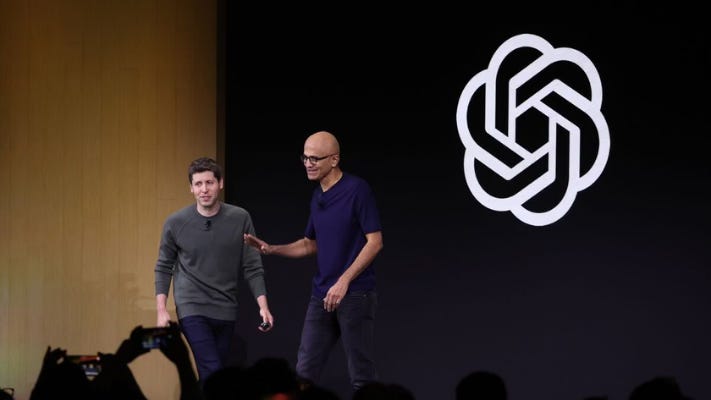OpenAI and Microsoft vie for control over the technology shaping the future
Power plays in the age of AI
Image: Bloomberg
Few alliances have shaped the field of artificial intelligence (AI) more than the courtship between Microsoft and OpenAI. Since 2019 the tech behemoth from Redmond has poured in billions and supplied computing muscle via Azure, as well as securing privileged access to OpenAI’s algorithms, all in exchange for a front-row seat to what many believe is the future of computing.
But the relationship, like many in Silicon Valley, has entered its “it’s complicated” phase. The issue is not whether AI will change the world—it already has—but who gets to shape and sell that transformation. OpenAI, the non-profit-turned-capped-profit firm helmed by Sam Altman, wants out of its gilded cage. It is eyeing a corporate conversion that would allow it to raise more money, possibly go public and, not incidentally, dilute Microsoft’s claims to its intellectual property. Microsoft, for its part, is in no mood to play a passive investor. It wants a larger stake in the post-conversion entity and permanent access to OpenAI’s wares, especially if the startup reaches its self-declared endgame: artificial general intelligence (AGI).
That tug-of-war comes at an awkward time. AI has gone from science fiction to strategic asset in record time. Governments are scrambling to regulate it; corporations are racing to monetise it. Against this backdrop, the OpenAI–Microsoft pact, praised as a model of industrial collaboration, has begun to resemble a Cold War détente: productive but fragile and bristling with suspicion.
The strain is evident. OpenAI is reportedly considering a “nuclear option”: accusing Microsoft of anticompetitive behaviour, possibly inviting regulatory scrutiny into their contract. It would be an extraordinary move, tantamount to inviting Caesar to audit the Senate.
But the fact it is even on the table underlines the level of mistrust. One source of tension is the acquisition of Windsurf, a $3bn coding startup. Microsoft’s access to OpenAI’s intellectual property would, by default, extend to Windsurf’s code, a prospect the startup is desperate to avoid.
The original sin, if one may call it that, was OpenAI’s desire to be both ethical steward and commercial juggernaut. It began life as a non-profit, pledged to advance safe AI. But building cutting-edge models turned out to be eye-wateringly expensive. Hence the cap-profit structure, which permits investors to make a return (albeit capped) while ostensibly keeping OpenAI’s mission intact. In practice it has created a corporate chimera—part mission-driven lab, part money-hungry startup—constantly negotiating the contradictions within.
Nowhere are these contradictions more acute than in its dealings with Microsoft. The latter has not merely invested: it has embedded itself into OpenAI’s business model. Azure is its exclusive cloud provider. Microsoft markets OpenAI’s products. Its engineers work closely with OpenAI’s teams. And yet the companies increasingly compete on coding tools, enterprise AI solutions and even consumer chatbots.
Microsoft’s GitHub Copilot goes head-to-head with OpenAI’s Codex. It has reportedly set up a rival model-building effort under its own roof. All that’s missing is a declaration of independence. Microsoft’s leverage is contractual. It has access to OpenAI’s models and early research. It also has the ability to commercialise via its own platforms. And it reportedly wants to retain access even after OpenAI reaches AGI (whenever that happens and whatever that means). (Some technologists believe AGI is a mirage; others think it is around the corner. The consensus: there isn’t one.)
OpenAI meanwhile has a clock ticking ominously in the background. If it fails to complete its corporate conversion by year’s end, it risks forfeiting as much as $20bn in potential funding. That gives Microsoft considerable bargaining power—and OpenAI ample reason to seek other suitors. Its attempts to bring in rival cloud providers signal a strategic diversification. No startup, however potent, wants to be caught in a monogamous cloud marriage.
This squabble is not occurring in a vacuum. The Federal Trade Commission (FTC) under the Biden administration has already launched a broad antitrust probe into Microsoft’s AI investments. Regulators are waking up to the fact that AI is an infrastructural revolution. The firms that control its pipelines—data, models, chips, compute—may well control the digital economy. That makes OpenAI’s concerns about competition more than just corporate whining.
Still, the prospect of one of the most prominent AI firms reporting its own investor to the authorities has all the logic of a snake suing its own tail. Imagine if Bell Labs had tried to break up AT&T while still using its telephones. ■

